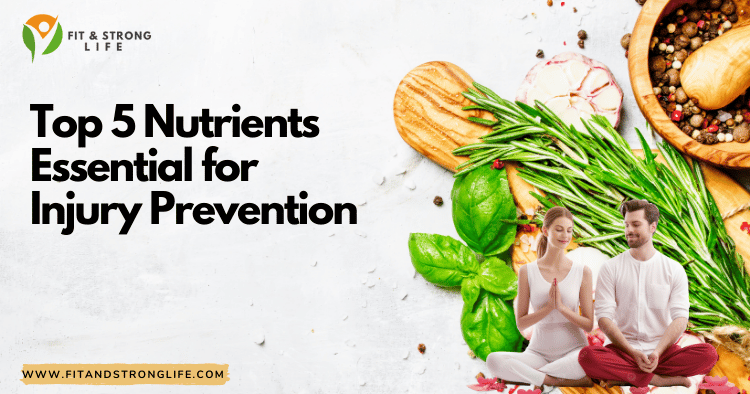Injury prevention is crucial for athletes and active individuals alike. While training, proper technique, and adequate rest play significant roles, nutrition is an often-overlooked aspect of keeping your body healthy and resilient. In this article, we will explore the top five nutrients that are essential for preventing injuries and ensuring optimal performance.
Table of Contents
1. Protein
Protein is often hailed as the building block of life, and for good reason. It plays a crucial role in muscle repair and recovery, which is particularly important for athletes and those engaged in regular physical activity.
What Does Protein Do?
When you exercise, you create tiny tears in your muscle fibers. Protein helps repair these tears, resulting in stronger muscles. Moreover, adequate protein intake can enhance recovery time, reducing the risk of overuse injuries.
How Much Protein Do You Need?
The average adult needs about 0.8 grams of protein per kilogram of body weight. However, athletes might require between 1.2 to 2.0 grams of protein per kilogram, depending on their level of activity and type of sport.
Best Sources of Protein
- Lean meats (chicken, turkey, lean beef)
- Fish (especially fatty fish like salmon)
- Eggs
- Dairy products (Greek yogurt, cottage cheese)
- Plant-based sources (tofu, lentils, beans, quinoa)
For more detailed guidelines on protein intake, check out this resource from the American College of Sports Medicine.
2. Omega-3 Fatty Acids
Omega-3 fatty acids are essential fats that offer numerous health benefits, including reducing inflammation and promoting joint health.
Why Are Omega-3s Important for Injury Prevention?
Injuries often come with inflammation, which can slow down recovery. Omega-3s help to mitigate this inflammation, potentially reducing the risk of injuries related to chronic joint pain or swelling.
How Much Do You Need?
The general recommendation for omega-3 intake is about 250-500 milligrams per day for healthy adults. However, athletes may benefit from higher doses, particularly if they experience joint issues.
Best Sources of Omega-3 Fatty Acids
- Fatty fish (salmon, mackerel, sardines)
- Walnuts
- Chia seeds
- Flaxseeds
- Fish oil supplements
For more insights, visit the National Institutes of Health.
3. Vitamin D
Vitamin D is often referred to as the “sunshine vitamin” because your body produces it in response to sunlight. It’s vital for bone health and muscle function.
How Does Vitamin D Help?
Vitamin D helps the body absorb calcium, which is essential for maintaining strong bones. A deficiency can lead to weakened bones, increasing the risk of fractures and injuries.
How Much Vitamin D Do You Need?
The recommended daily allowance for adults is 600 to 800 IU, depending on age. However, some studies suggest that athletes may require higher amounts to optimize performance and recovery.
Best Sources of Vitamin D
- Sunlight (15-30 minutes of exposure several times a week)
- Fatty fish
- Fortified dairy products
- Egg yolks
- Supplements (if necessary)
For more information, check out Vitamin D and Health.
4. Calcium
Calcium is another crucial nutrient for maintaining strong bones and muscles. It works in tandem with Vitamin D to ensure your body can function optimally.
Why Is Calcium Important?
Calcium is vital for bone health, muscle contractions, and nerve signaling. Inadequate calcium intake can lead to decreased bone density, increasing the risk of fractures and injuries.
How Much Calcium Do You Need?
Most adults need about 1,000 to 1,200 mg of calcium daily, depending on age and gender.
Best Sources of Calcium
- Dairy products (milk, cheese, yogurt)
- Leafy green vegetables (kale, broccoli)
- Fortified foods (tofu, cereals)
- Almonds
- Sardines
For more details, refer to the National Institutes of Health Calcium Fact Sheet.
5. Magnesium
Magnesium plays a key role in muscle function, energy production, and bone health. It is often overlooked, yet it’s crucial for injury prevention.
How Does Magnesium Help?
Magnesium helps to relax muscles and can prevent cramps and spasms, which are common during intense workouts. It also supports energy production, enabling you to train effectively without overexertion.
How Much Magnesium Do You Need?
The recommended dietary allowance for magnesium is around 310-420 mg per day for adults, depending on gender and age.
Best Sources of Magnesium
- Nuts and seeds (almonds, pumpkin seeds)
- Whole grains (brown rice, quinoa)
- Leafy green vegetables
- Dark chocolate
- Avocado
For more information, visit the National Institutes of Health Magnesium Fact Sheet.
Conclusion
Injury prevention is a multifaceted approach that includes proper training, rest, and nutrition. By focusing on these five essential nutrients—protein, omega-3 fatty acids, vitamin D, calcium, and magnesium—you can significantly reduce your risk of injuries and improve your overall performance. Remember, it’s always best to consult with a healthcare professional or a registered dietitian for personalized advice tailored to your specific needs.
Also Look For:
FAQs
1. Can I get enough nutrients through diet alone?
Yes, a balanced diet rich in whole foods can provide the necessary nutrients for injury prevention. Sometimes supplements may be needed, especially for specific deficiencies.
2. How long before a workout should I eat?
Aim to eat a balanced meal containing protein and carbohydrates 2-3 hours before exercising for optimal performance.
3. Are there any side effects to excessive intake of these nutrients?
Yes, excessive intake can lead to health issues. It’s important to stick to recommended guidelines and consult a healthcare provider if unsure.
For more tips on nutrition for injury prevention, check out Healthline.
By incorporating these nutrients into your diet, you can enhance your resilience against injuries and maintain a healthy, active lifestyle.



